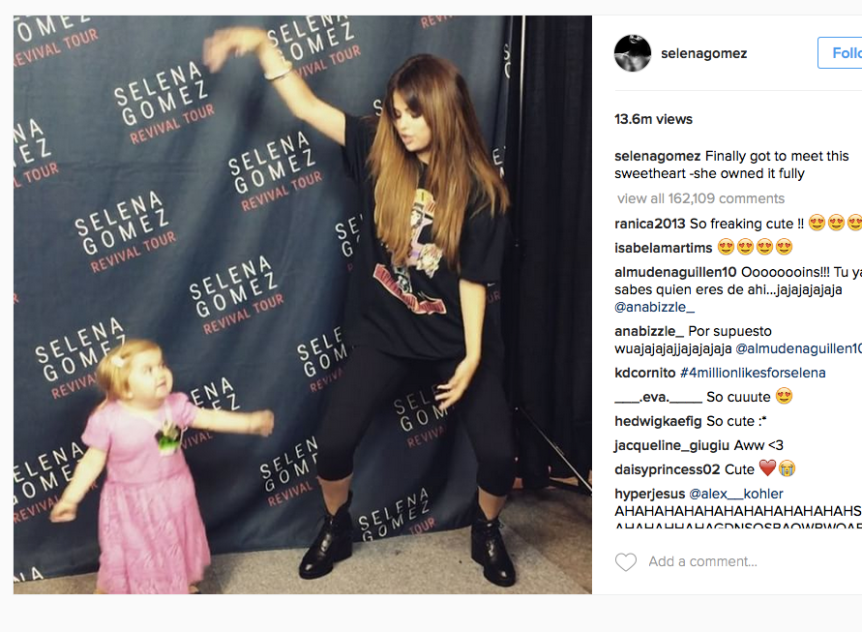My daughter Maria Yagoda, who first alerted me to the specifically British meaning of “fully,” sent along American entertainer Selena Gomez’s Instagram video of her dancing with a cute toddler. Selena’s message:
“Finally got to meet this sweetheart–she owned it fully.”
[NOTE: The comments on this post suggest there is some perplexity about the use of “fully” in the U.S. and in U.K./Australia. I direct you to my original post on the word. Basically, it’s commonly used here but in a more workmanlike way–usually before the verb, and specifically in opposition to partialness. “The bridge won’t be fully completed till next year,” “I don’t fully understand your point,” I fully appreciate your efforts,” etc. In the U.K. and in Australia (where this use originated and is most common), it’s a much more all-purpose intensifier; as the (Australian) author of the most popular definition on Urban Dictionary put it, “Said to mean Really, Totally, Completely, a lot, very much so or to add emphasis to something.” Americans would never say, “I fully hate that show,” or “I’m fully going to ask her for a date.”
As for the little girl “owning” the dance, that’s a piece of American slang denoting mastery.]



I really miss my baby daughters! they’re FULLY grown now and remind me regularly how old fashioned I am!!
What a lovely picture….
I don’t understand what “she owned it fully” means in this context.
“Completely”, “totally”.
What did she “own”.
I’m British – I’ve never heard this usage and have no idea what it means.
Apart from the strange (to British ears) use of “owned it”,this is the normal use of “fully” meaning “completely”.
I fully understand the comment! Had no idea this usage was BrE or AusE.
I really don’t think Americans would be any less likely than Englishmen or Australians to say “I fully hate that show,” or “I’m fully going to ask her for a date.” I think those would be just as unusual in the UK or Oz as they would be in the US. And while they are possible usages (albeit unusual) in the UK and Oz, they’re equally possible (and just as unusual) in the US.
I am British and have never heard or seen “fully” used in the sense of “definitely” indicated in this post.
Dominic, the meaning isn’t “definitely” but “totally” or “completely”.
I’m Australian (native English speaker). I’d never say “I fully hate that show” or “I’m fully going to ask her for a date” and have never heard either, anywhere.
Americans would never say, “I fully hate that show,” or “I’m fully going to ask her for a date.”
These both sound very odd to this Londoner’s ears as well. I don’t think I’ve ever heard anyone use “fully” like that in the UK. I might be guilty of horrible stereotyping, but I could sort of hear it working in a rural West Country accent (Cornwall/Devon/Somerset) but I’ve got no evidence to back up that hunch.
In regards to other people having never heard of ‘fully’ used in the context of totally or completely. I’ve heard it a lot and use it, eg ‘I’m fully going to do it’.
For context, I’m 24, from the midlands but living in London. I couldn’t tell you where/ when I picked up the word
Yeah, this is a youngish, urbanish usage, which explains why not everyone from UK/Aus/NZ has heard of it. (I’m not youngish but my kids are.)